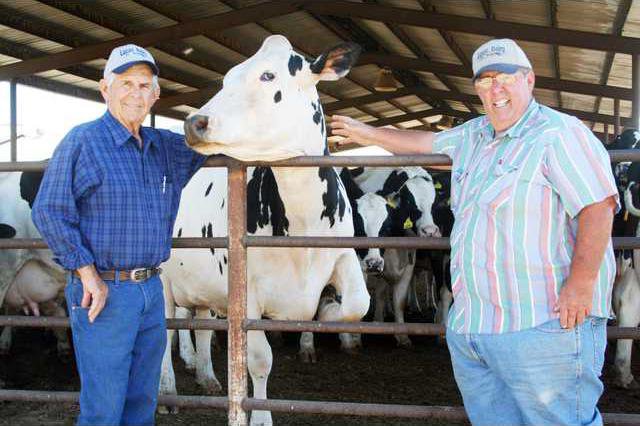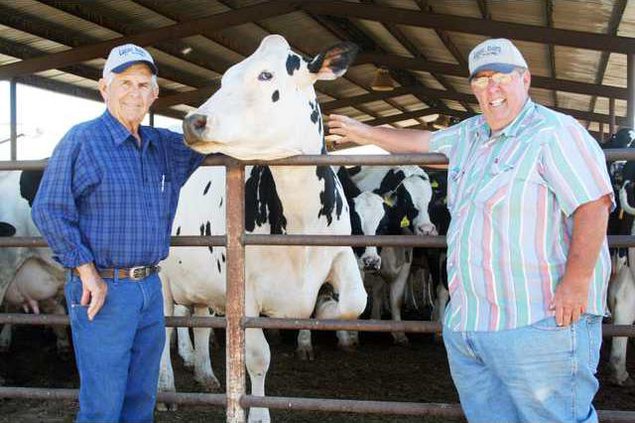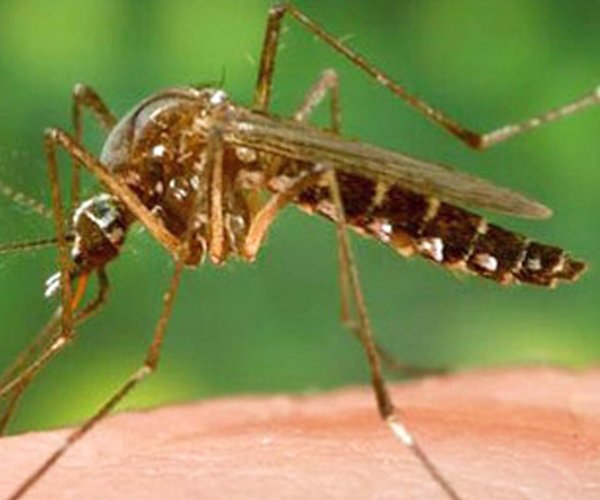California dairy farmers have been fighting a losing battle for the past two years and slowly turning into a dying breed. Norman and Mike Lucas, owners of Lucas Dairy, have been in the business for over 60 years and they are struggling just to come out even.
“Our biggest challenge is trying to make ends meet and that’s impossible,” said Norman Lucas. “We are at a standstill.”
Within the past two years, they have witnessed 15 to 20 dairies go out of business within a 10 mile radius of their Turlock dairy.
The main reason for the down dairy industry, according to the Lucas’ — overproduction of milk.
“The problem lies within the dairymen,” said Norman Lucas. “We have to cut down on our supply. Why grow when you can’t even sell what you are producing? I would rather milk fewer cows and make a profit.”
The overproduction of milk is partly due to the processors requesting more milk, said Mike Lucas. Processors are requesting more milk in their plants to keep their plants as efficient as possible and to make a profit.
“The processors are guaranteed a profit,” said Norman Lucas. “We aren’t.”
As they ask for more milk from dairymen, the processors make a profit, but the dairymen are going broke, he said. The state is saying that dairymen have met the supply so the cost of milk will remain the same, resulting in less money for dairymen who are overproducing milk.
It is supply and demand — when there is a shortage of milk, milk prices rise; and when there is too much milk, milk prices drop.
The Lucas’ solution — cut back on your supply and create a base for milk supply.
“(Dairymen) could control it if they tried,” said Norman Lucas. “We have to control supply.”
By controlling the supply, dairymen can keep the milk supply at a good demand level to keep milk prices at a decent rate.
“If we don’t do it together or a law doesn’t make us do it, then we won’t make it,” said Norman Lucas.
A base for dairymen could help create a profit and pull the whole industry out of the slump, he said.
Each dairyman could create their own base depending on how much milk their cows can produce, said Mike Lucas. If they go over that base and overproduce, that milk should be sold at a lower price.
As the Lucas Dairy focuses on not over producing and cutting back on their costs to save money, the thought of selling their dairy has crossed their minds but their family-run business is what keeps them hanging on.
Norman Lucas started the business over 60 years ago and now his son Mike Lucas runs the dairy. Mike’s son is also thinking about getting into the family business, giving the Lucas Dairy three generations of family tradition.
“If my son wasn’t coming into the family business, we might have thought differently,” said Mike Lucas.
The last two years have been the worst Norman Lucas has ever seen in the dairy industry, he said.
“The dairy business will continue to go in the same direction if we don’t do something quick,” he said. “It just doesn’t make sense to continue.”
On a good year, dairies will get $25 per cow and now people are losing $100 a cow, said Norman Lucas.
“Things need to get better,” said Mike Lucas. “We need a profit to stay in business. We borrow money to keep going but hopefully it will get better and we can pay back the borrowed money.”
The increase in feed costs is also hurting Lucas Dairy and their 1,800 cows, with only 800 of those profitable at this time.
Just for corn, Lucas Dairy spends about $8,000 to $9,000 a week for over 25 tons of corn that will last about four days, said Mike Lucas. The cost of their feed is their biggest expense, taking about 60 percent of their gross income.
“It’s tough,” said Mike Lucas. “We are going to struggle along for now and see how it goes. I hope we make it.”
To contact Maegan Martens, e-mail mmartens@turlockjournal.com or call 634-9141 ext. 2015.




